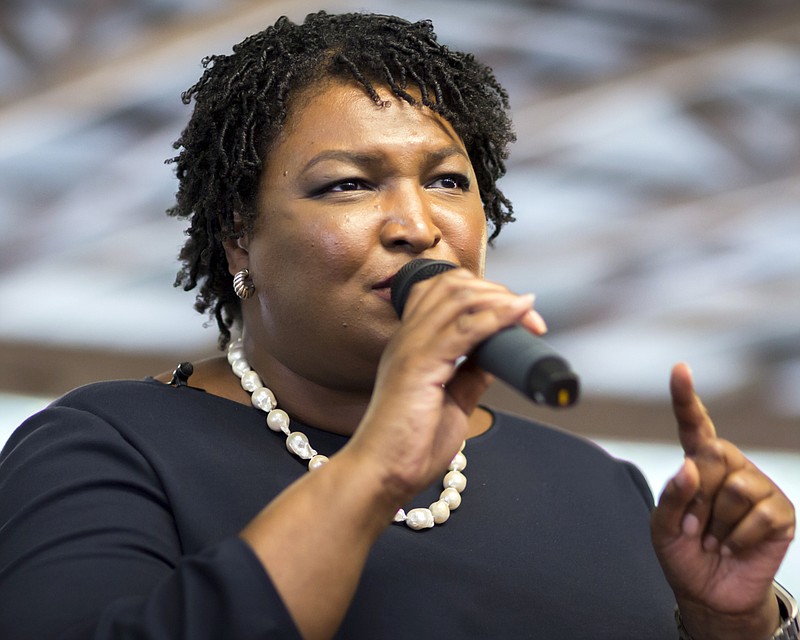If you thought the semi-concessions by candidates for governor in Georgia and Florida and United States Senate in Florida were the last you'd hear of election wrangling until the 2020 presidential campaign gets cranked up, think again.
For Democrats, you might just say the recounts in Georgia and Florida were the opening salvo for the next round of elections.
And, yes, any election between now and then that has a whiff of a chance to be competitive will be treated the same way by the party that gained back control of the U.S House earlier this month. Expect fly-ins from Hollywood celebrities, appearances from potential presidential candidates, money coming in as if there were no tomorrow.
Expect challenges of election rules and voter purges, more fights against the use of photo IDs, charges of rigging elections and racism and keeping voters from polls, and dragged out recounts if there's a close race.
Where might we expect such fun in 2019?
Kentucky and Mississippi, both in the South like Georgia and Florida, look to be the busiest playgrounds.
Kentucky Gov. Matt Bevin won his Republican primary in 2015 by 83 votes and then took the general election with 52 percent of the vote. He is only the state's third Republican governor in the last 51 years, and neither of the previous two served a second term.
One of his declared Democratic opponents, Andy Beshear, is the son of Bevin's two-term gubernatorial predecessor, Steve Beshear, and is the state's attorney general. Another is Alison Lundergan Grimes, the state's secretary of state and the state's Democratic candidate for U.S. Senate against Republican Majority Leader Mitch McConnell in 2014.
In Mississippi, an open seat for governor looms as two-term Republican Phil Bryant is term-limited. One who has declared is Jim Hood, the state's four-time elected attorney general and the only Democrat holding statewide office. A potential Republican is Lt. Gov. Tate Reeves, who was twice elected state treasurer before being elected to his first term as lieutenant governor in 2011.
That election could be complicated if Democrat Mike Espy, currently in a runoff for a U.S. Senate seat in the state, loses next week's contest against Republican Cindy Hyde-Smith and decides to get in the race. Espy is a former U.S. House member and secretary of agriculture under President Bill Clinton.
A third gubernatorial election - in Louisiana - is on tap, but first-term moderate Democrat John Bel Edwards is not seen as particularly vulnerable in the conservative state.
A number of mayoral elections will be held in cities like Chicago and Philadelphia, but large cities are one of the few reliable constituencies Democrats have left, so competitive races are not likely to be in the offing.
With what is likely to be nearly a 30-vote majority in the U.S. House, Democrats won't have to treat any special election that occurs between now and November 2020 as the be-all, end-all opportunity as they did in President Donald Trump's first year in office.
People forget, though, that Republicans swept all five competitive House elections in 2017 despite Democrats predictions' of wins amid visits for their candidates by Hollywood celebrities, former presidential candidates and an influx of out-of-district money.
Still, we think they'll continue to pull out all the stops - like they did in Georgia and Florida - to try to paint the election as anything but fair and their opponents as racists or cheaters.
Democrat Stacey Abrams, for instance, may be the most ungracious loser in recent years, saying only Republican Gov.-elect Brian Kemp "won an adequate number of votes to become the governor of Georgia," that he would become the "legal governor or Georgia," that the election "was [not] done properly," that "more than a million voters" had been disenfranchised and that she would file a lawsuit to contest the election based on "gross mismanagement."
Kemp won by nearly 55,000 votes, a margin too large even to trigger a runoff.
In the Florida governor's race, Democrat Andrew Gillum blamed the state's voting system for his loss, though his vote total changed little after the 34,000-vote difference between him and Republican Gov.-elect Ron DeSantis forced a machine recount.
He also charged voter disenfranchisement and belittled having "the appropriate form of identification" and whether "their signature today matched the one yesterday" as "arbitrary things
In the Florida Senate race, three-term Democratic Sen. Bill Nelson finally conceded after his call to lift recount deadlines and filing a lawsuit didn't work. He also said a poor ballot design may have cost him the race, which he lost to outgoing Gov. Rick Scott by more than 10,000 votes.
Indeed, we think 2019 will be full of Democrats attempting to wheedle for, go to court for and attempt to legislate for anything they think will give them an advantage at the polls in that year and in the presidential election year of 2020. We hope Republicans - too often unwilling to speak up and defend themselves - are up to the task.
